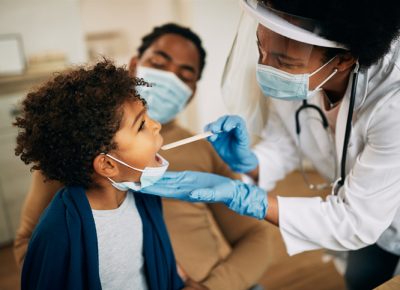Viruses are the most common cause of a sore throat. Strep throat (Streptococcal Pharyngitis) is an infection in the throat and tonsils caused by bacteria called group A Streptococcus (group A strep). Group A strep bacteria live in the nose and throat and easily spread to other people via respiratory droplets when talking, coughing or sneezing. Infected people might also spread the bacteria from infected sores on their skin. It usually takes two to five days for someone exposed to group A strep to become sick with strep throat. Some infected people never experience symptoms or seem sick. However, if you experience symptoms or are sick with strep throat you are much more contagious than those who do not have symptoms.
In general, strep throat is a mild infection, but it can be very painful. Pain and fever without a cough are common signs and symptoms of strep throat.
What are Common Symptoms of Strep Throat?
- Sore throat that can start very quickly
- Pain when swallowing
- Fever
- Red and swollen tonsils, sometimes with white patches or streaks of pus
- Tiny, red spots (petechiae) on the roof of the mouth
- Swollen lymph nodes in the front of the neck
Other symptoms may include a headache, stomach pain, nausea or vomiting — especially in children. Someone with strep throat may also have a rash; when this happens, it is known as scarlet fever.
If you have the following symptoms, you probably have a virus instead of strep throat:
- Cough
- Runny nose
- Hoarseness (changes in your voice that make it sound breathy, raspy, or strained)
- Conjunctivitis (pink eye)
It is Possible to Confuse Strep Throat Symptoms with COVID-19 Symptoms
Strep throat symptoms can be confusing and concerning. In addition to a sore throat, strep throat and COVID-19 can produce many of the same symptoms, including:
- Fever
- Headache
- Body aches
- Vomiting
Each of these illnesses also produces its own unique set of symptoms, which is why you need to be on the lookout to determine if you have strep throat, COVID-19 or something else.
You might have COVID-19 and not strep throat if you are experiencing:
- Coughing
- Difficulty breathing
- Shortness of breath
- Congestion
- New loss of smell and/or taste
Another important distinction between strep throat and COVID-19 is how quickly symptoms appear—the throat soreness associated with strep throat tends to appear suddenly, while COVID-19 symptoms seem to come on more gradually.

How Can I Get Strep Throat?
You might get sick with strep throat if you:
- Breathe in respiratory droplets that contain the bacteria
- Touch something with those droplets on it and then touch your mouth or nose
- Drink from the same glass or eat from the same plate as a person infected with group A strep
- Touch sores on the skin caused by group A strep or come into contact with fluid from the sores
When Might You Be at Risk for Strep Throat?
Anyone can get strep throat, but there are some factors that can increase the risk of getting this common infection. Strep throat is more common in children than adults. It is most common in children 5 through 15 years old. It is very rare in children younger than 3 years old.
Adults who are at increased risk for strep throat include:
- Parents of school-aged children
- Adults who are often in contact with children
Close contact with another person with strep throat is the most common risk factor for illness. For example, if someone has strep throat, the bacteria often spread to other people in their household.
Infectious illnesses tend to spread wherever large groups of people gather. Crowded settings can increase the risk of getting a group A strep infection.
How do I Get Diagnosed with Strep Throat?
A simple test at Everest Urgent Care provides fast results. Your medical professional will determine what type of illness you have by asking about symptoms and doing a physical exam. To determine if you have strep throat, they will swab your throat to test for strep. There are two types of tests for strep throat: a rapid strep test and throat culture.
A rapid strep test involves swabbing the throat and running a test on the swab. Performed at Everest Urgent Care, the test quickly shows if group A strep is causing the illness. If the test is positive, your medical professional can prescribe antibiotics. If the test is negative, but your medical professional still suspects strep, then he / she can take a throat culture swab. A throat culture takes time to see if group A strep bacteria grow from the swab. While it takes more time, a throat culture sometimes finds infections that the rapid strep test misses.
What is the Typical Treatment for Strep Throat?
Strep throat is typically treated with antibiotics. Either penicillin or amoxicillin are recommended as a first choice for people who are not allergic to penicillin. Someone with strep throat should start feeling better in just a day or two after starting antibiotics. You should call your medical provider if you or your child are not feeling better after taking antibiotics for 48 hours.
The benefits of antibiotics include:
- Decreasing how long someone is sick
- Decreasing symptoms (feeling better)
- Preventing the bacteria from spreading to others
- Preventing serious complications like rheumatic fever
Someone who tests positive for strep throat but has no symptoms (called a “carrier”) usually does not need antibiotics. They are less likely to spread the bacteria to others and very unlikely to get complications. If a carrier gets a sore throat illness caused by a virus, the rapid strep test can be positive. In these cases, it can be hard to know what is causing the sore throat. If someone keeps getting a sore throat after taking the right antibiotics, they may be a strep carrier and have a viral throat infection. You should talk with a medical professional if you think you or your child may be a strep carrier.
Can a Strep Throat Cause Other Complications?
Complications can occur after a strep throat infection. This can happen if the bacteria spread to other parts of the body. Complications can include:
- Abscesses (pockets of pus) around the tonsils or in the neck
- Swollen lymph nodes in the neck
- Sinus infections
- Ear infections
- Rheumatic fever (a heart disease)
- Post-streptococcal glomerulonephritis (a kidney disease)
Protect Yourself from Strep Throat
You can get strep throat more than once. Having strep throat does not protect someone from getting it again in the future. While there is no vaccine to prevent strep, there are things people can do to protect themselves and others.
Good Hygiene Helps Prevent Group a Strep Infections
To practice good hygiene, you should:
- Cover your mouth and nose with a tissue when you cough or sneeze
- Put your used tissue in a waste basket
- Cough or sneeze into your upper sleeve or elbow, not your hands, if you don’t have a tissue
- Wash your hands often with soap and water for at least 20 seconds
- Use an alcohol-based hand rub if soap and water are not available
- You should wash glasses, utensils, and plates after someone who is sick uses them
- Wash your hands often to help prevent germs from spreading
Antibiotics Help Prevent Spreading the Infection to Others
Diagnosed with strep? You should stay home from work, school or daycare until you:
- No longer have a fever AND
- Have taken antibiotics for at least 12 hours
- Take the prescription exactly as your medical provider tells you to. Don’t stop taking the medicine, even if you or your child feel better, unless the doctor says to stop.
Everest Urgent Care Tests for Strep
Not sure if you have strep throat or something else? The medical providers at our Urgent Care locations in Upper Darby and Chester have extensive experience testing for, diagnosing and treating strep throat and other illnesses like Covid-19. No appointment is necessary.

